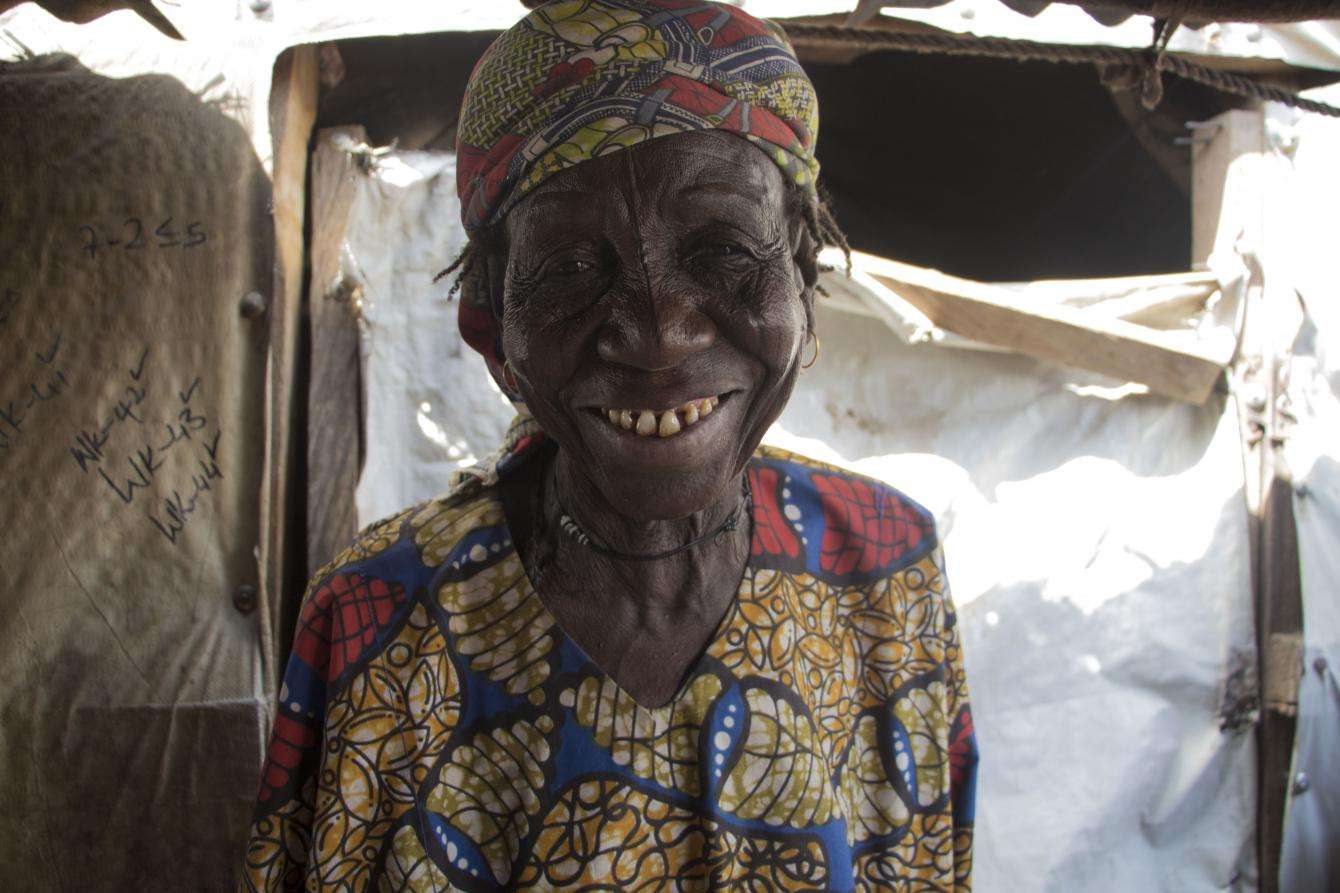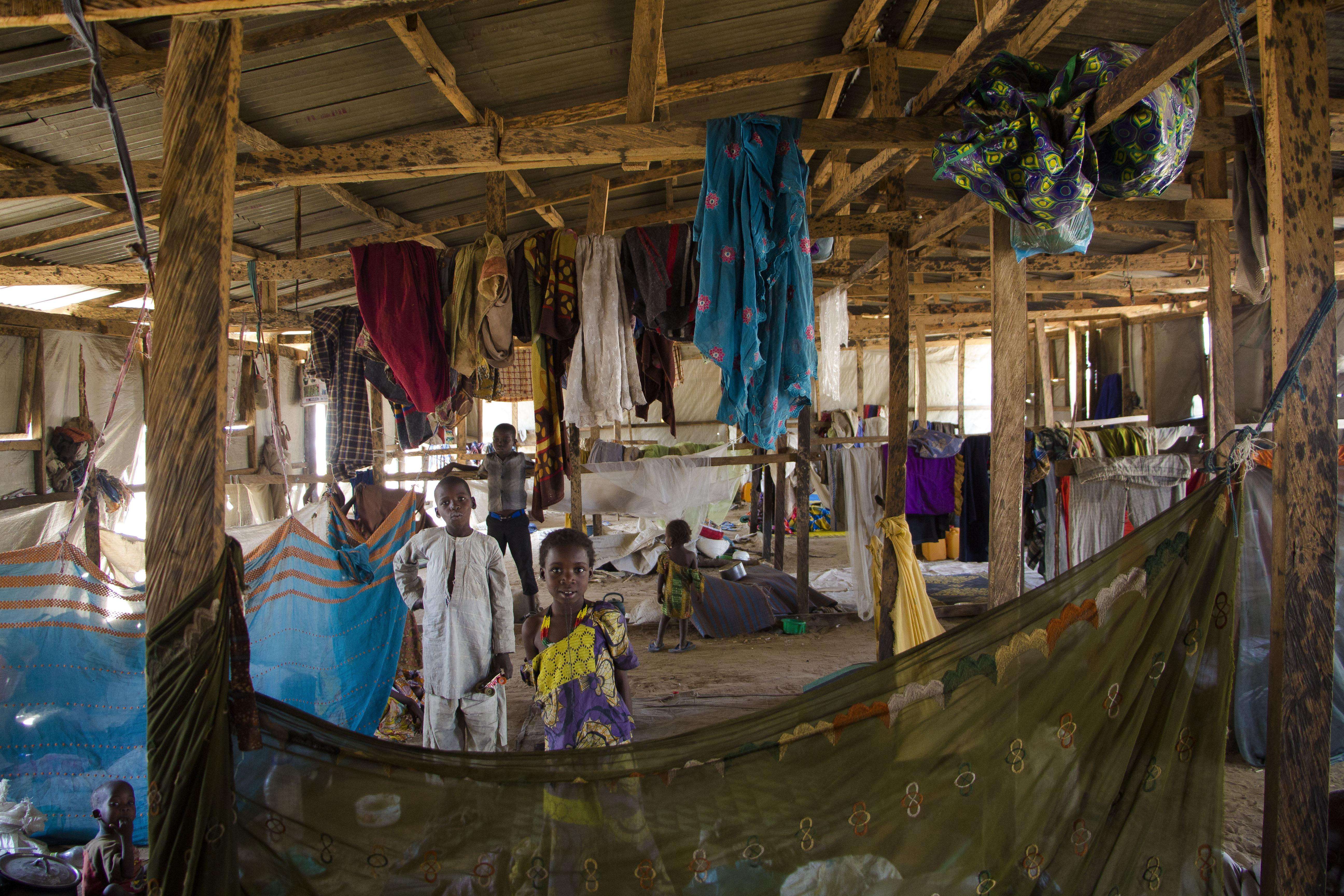The humanitarian emergency in northeastern Nigeria is far from over for the nearly two million people forced to flee their homes over the past nine years, and more join their ranks daily as violence continues. Caught in a grinding conflict between the Nigerian military and non-state armed groups, scores of people in Borno and Yobe states struggle to find food, water, or shelter and are reliant on humanitarian assistance for survival.
Eighty-year-old widow Maryam Sofo lives in a camp for displaced people in the town of Bama. Two years ago, her family left their hometown of Banki, near the border with Cameroon, after frequent attacks made daily life extremely difficult. Maryam was too sick to move, so her family was forced to make the wrenching decision to leave her behind. After they left, she lived alone, surviving on food distributed by aid organizations, but too weak to collect firewood or cook for herself. In November 2018, she felt strong enough to join her son and his family in Bama, some 40 miles to the northwest. But upon arrival, she found that life in the camp was anything but easy.
“Life here is worrying,” says Maryam. “I arrived 20 days ago, soon after the monthly distribution of food and relief items had taken place in the camp. I haven’t received anything since I arrived here. I have no food, no blanket, no jerry can to collect water, no mat on which to sleep. All I have in this world are the clothes on my back.”
Millions displaced
For Maryam, like the nearly two million others forced from their homes in the region, the only significant change with the advent of the dry season is an increase in violence and insecurity, making them even more vulnerable. On top of losing their homes, many have lost family members and survived violent attacks. Confined to camps, their prospects are extremely limited and they are dependent on aid to survive.
“People have been stranded in camps for years,” says Luis Eguiluz, MSF head of mission in Nigeria. “They have limited freedom of movement outside the camps, which prevents them from providing for themselves, and they have little prospect of returning home because of the continuing conflict.”
Even though people in the camps are entirely dependent on aid, there is often not enough to go around. “Humanitarian assistance is insufficient and does not cover all of their needs in terms of health, water, shelter, and protection,” says Eguiluz. “In Gwoza, we have seen food distributions being reduced; in Pulka, the water supply is inadequate and 4,000 people are in a transit camp waiting to be allotted shelters. It’s the same in Bama, where newly arrived people have at times been sleeping under trees or sharing communal shelters with 70 other people for months on end.”

Dire conditions
Delivering aid in northeastern Nigeria is challenging because of the volatile security situation and the fact that many areas are inaccessible to aid agencies. Military operations are ongoing in many parts of Borno State, and attacks occur regularly on roads connecting towns, as well as in town centers. As a result, aid agencies are often forced to depend on airplanes to transport staff and supplies to areas outside the state capital, Maiduguri. But even in places with fewer security constraints, there is often not enough aid to go around.
Poor living conditions in the camps and the lack of aid have resulted in a number of health emergencies, including a recent outbreak of cholera. “MSF had to scale up its activities in Maiduguri and in several other towns in Borno and Yobe states in response to a cholera outbreak that was declared by the Ministry of Health in September 2018,” says Dr. Louis Vala, MSF’s medical coordinator in Nigeria. “MSF treated more than 8,000 cholera patients and vaccinated 332,700 people against the disease in 2018 alone.”
In early January 2019, MSF also intervened in Maiduguri to support newly displaced people, providing medical support, distributing blankets and soap, and building latrines. More than 8,000 people arrived in Maiduguri in a matter of weeks after fleeing increasing conflict in the north of the State. “The intensity of the crisis and its humanitarian consequences have not diminished,” says Eguiluz, “while many people who are in need of assistance are not receiving it.”
Cut off from aid
At the same time, the UN Office for the Coordination of Humanitarian Affairs (OCHA) estimates that 800,000 people are living in areas completely out of reach of aid organizations. While little is known about their living conditions and needs, the condition of people arriving from those areas is, in some places, extremely worrisome.
An epidemiological study carried out by MSF in September 2018 showed that 8.2 percent of children arriving in Bama since May 2018 suffered from severe acute malnutrition and 20.4 percent had global acute malnutrition—both far above emergency thresholds. These alarming rates likely reflect the desperate living conditions and acute needs of people living in insecure areas that aid organizations cannot reach.
“The emergency in northern Nigeria is far from over,” says Eguiluz. “The nutritional figures we found in Bama in September 2018 are [comparable], if not worse, than when the critical nutritional status of the Borno population became public knowledge a couple of years ago. Now is not the time to reduce emergency humanitarian assistance in Borno. People are heavily dependent on external help for survival and currently these basic needs remain unmet. The population suffers daily from the consequences of the ongoing conflict and it is vital to ensure that they have at least basic assistance, especially in areas outside Maiduguri.”
MSF has been providing lifesaving medical care in northern Nigeria’s Borno and Yobe states since 2014. MSF currently runs projects in Maiduguri, Damaturu, Bama, Ngala, Rann, Pulka, and Gwoza, while emergency teams respond to disease outbreaks and other urgent humanitarian needs.
From January to October 2018, our teams in northern Nigeria provided more than 98,000 outpatient consultations, admitted almost 32,000 patients to hospitals, treated 6,000 severely malnourished children with outpatient care, and admitted 6,300 severely malnourished children to hospital for inpatient care.




